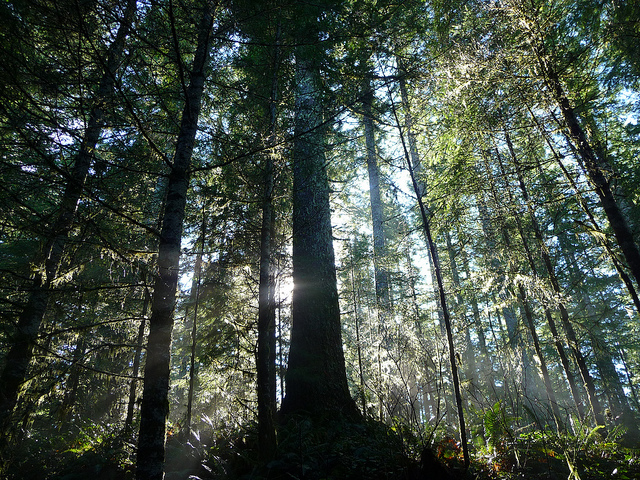
The old-growth Douglas fir featured on our state’s license plate is a powerful image for Oregonians. During the timber wars of the 1980s and early ’90s, bitter political battles were fought over logging old-growth forests. Today, values have changed and a proposal to clear-cut centuries-old trees would spark outrage among most Oregonians.
Unfortunately, when it comes to logging old-growth, Oregon’s state government doesn’t always live up to the values of its citizens. This frustrating reality is playing out once again in the debate over privatizing the Elliott State Forest.
This 93,000-acre forest, located in the Coast Range east of Coos Bay, is unique among Oregon’s rich heritage of parks and public lands. Of all the state-owned forest land in Oregon, only the Elliott still contains a substantial stand of old-growth. Approximately 41,000 acres of the Elliott contains forest more than a century old.
That old-growth sustains some of the cleanest rivers in the Coast Range, as well as valuable runs of coho and chinook salmon and steelhead. It provides critical habitat for wildlife protected under state and federal law. It’s an enormous carbon bank where vast amounts of climate change-causing pollution is captured and stored. The Elliott’s proximity to places like Loon Lake, the Dean Creek Elk Viewing Area, the Oregon Dunes National Recreation Area, and Golden and Silver Falls State Park — and the fact that it is public land that everyone can use and enjoy — help make it an Oregon treasure.
But rather than view the Elliott as a treasure, the State Land Board is considering privatizing it — selling off some or all of the forest to logging corporations. Three parcels totaling 1,453 acres have already been auctioned off, and Seneca Jones Timber Co., one of the winning bidders, has already said “…we will be clear-cutting.”
Oregon’s State Land Board — made up of Gov. John Kitzhaber, Secretary of State Kate Brown and State Treasurer Ted Wheeler — is considering privatizing the Elliott State Forest because the land is tied to Oregon’s Common School Fund. This fund is based on an antiquated model of using logging, grazing, and mining to fund education. While that idea may have made sense in 1859, in 2014 it is as out of date as covered wagons.
Over the last several decades, the state has logged the Elliott to generate revenues for this fund. Because maximizing logging revenues conflicts with laws that protect clean drinking water and endangered wildlife, the modest amount of money generated through logging the Elliott has declined as environmental safeguards have increased.
In response to these declines, the Land Board is now considering selling off some, or all, of the forest. If Kitzhaber, Brown and Wheeler support such a move, the entire forest, including its old-growth, would likely be clear-cut under Oregon’s weak private lands logging rules.
In 2014, surely we can find a better way to fund our children’s education than through privatizing and clear-cutting their natural heritage.
The members of the Land Board have all expressed the desire for an alternative way forward that protects the Elliott. It’s time for them to lead the way. They should pull the plug on proposals to privatize the Elliott State Forest, and instead work with the Legislature to modernize the Oregon Common School Fund and end its dependence on clear-cut logging.
The Elliott can and should continue to be an economic engine for Southwest Oregon. There is room for sustainable timber production, but the Elliott’s century-old forests should be set aside and protected as a legacy for future generations. Clear-cutting, particularly old-growth clear-cutting, has no place in the Elliott (or anywhere else in Oregon). The state should also explore expanding recreational opportunities in this one-of-a-kind area, with campgrounds and trails that will draw new people, investment and jobs to the region.
Oregonians treasure our heritage of parks, forests, and other public lands, and we want to see them preserved and passed down for our children and grandchildren to use and enjoy.
We need the members of the Oregon Land Board to act on their own values and those of most Oregonians, and show the leadership and creativity needed to save the Elliott State Forest.
Steve Pedery is the conservation director for Oregon Wild. Rhett Lawrence is the conservation director for the Oregon Chapter of Sierra Club.
 '
'
